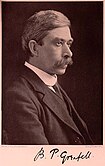Papyrus 27
Appearance
| New Testament manuscript | |
| Name | P. Oxy. 1355 |
|---|---|
| Text | Romans 8-9 † |
| Date | 3rd century |
| Script | Greek |
| Found | Egypt |
| Now at | Cambridge University Library |
| Cite | B. P. Grenfell & A. S. Hunt, Oxyrynchus Papyri XI, (London 1915), pp. 9-12 |
| Size | 13 x 25 |
| Type | Alexandrian text-type |
| Category | I |

Papyrus 27 (in the Gregory-Aland numbering), designated by 𝔓27, is an early copy of the New Testament in Greek. It is a papyrus manuscript of the Epistle to the Romans, it contains only Romans 8:12-22.24-27; 8:33-9:3.5-9. The manuscript paleographically has been assigned to the early 3rd century. It is written in 43 lines per page. The scribe of this manuscript may have also written 𝔓20.[1]
The Greek text of this codex is a representative of the Alexandrian text-type. Aland placed it in Category I.[2] This manuscript shows agreement with Codex Sinaiticus, Vaticanus and other witnesses of the Alexandrian text-type.[1]
It is currently housed at the Cambridge University Library (Add. 7211) in Cambridge.[2][3]
See also
References
- ^ a b Comfort, Philip W.; David P. Barrett (2001). The Text of the Earliest New Testament Greek Manuscripts. Wheaton, Illinois: Tyndale House Publishers. p. 119. ISBN 978-0-8423-5265-9.
- ^ a b Aland, Kurt; Aland, Barbara (1995). The Text of the New Testament: An Introduction to the Critical Editions and to the Theory and Practice of Modern Textual Criticism. Erroll F. Rhodes (trans.). Grand Rapids: William B. Eerdmans Publishing Company. p. 97. ISBN 978-0-8028-4098-1.
- ^ "Liste Handschriften". Münster: Institute for New Testament Textual Research. Retrieved 23 August 2011.
Further reading
- B. P. Grenfell & A. S. Hunt, The Oxyrhynchus Papyri XI (London 1915), pp. 9–12.



